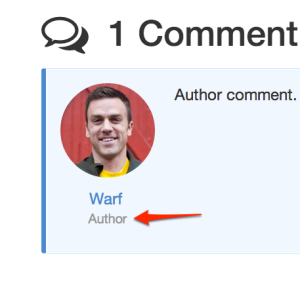For sites with an active user base, customizing WordPress’ comment system can add great value. There are quite a few ways to customize author comments in WordPress. For this tutorial, I’ll show you how to add additional content to only the post author’s comments. This is one way to make the author’s comments standout on your WordPress blog.
Comments Template Files
First, we need to figure out which template files we’re going to edit. You’ll want to find your comment list output.
If you open up the comments.php file in your theme’s directory, it’s possible you’ll see your comment list in there. However, it’s much more likely you’ll just see a call to wp_list_comments(). If your theme already has created some custom HTML for your comments list, you’ll probably find it in the functions.php file.
Your call to wp_list_comments() will look like this:
wp_list_comments('callback=function_name');Search in your functions.php file for whatever you see in place of “function_name”, and that’s where your custom comment output will be.
How to edit your comments list HTML output is beyond the scope of this article, but DigWP has you covered. We’ll assume you already have your custom output setup.
Add Something to the Comments Output
Check If Comment Belongs to the Author
Once you’ve got your custom comments output setup, the first thing we need to do is check to see if a comment belongs to the author of the post. At the very top of your file, let’s store two variables.
$comment_author_email– This stores the email address of the commenter$post_author_email– This stores the email address of the post author
Inside your php tags, add the following:
$comment_author_email = get_comment_author_email();
$post_author_email = get_the_author_meta('user_email');Now we setup a simple if statement to check if the comment author’s email is equal to the post author’s email.
<?php if ( $comment_author_email == $post_author_email ) { ?>
// add your content here
<?php } ?> // end if is authorAdd “Author” if Comment is by the Post Author
Here’s a better example of what our code looks like. We’re using the Bootstrap framework, so you’ll see some classes added for styling. Essentially, this code is outputting the comment author’s avatar, then their name (which links to their website, if they provided one), and IF it’s the post author, we’ve added a line break, followed by the word “Author.”
<div class="comment-meta pull-left">
<?php echo get_avatar( $comment, 96 ); ?>
<p class="text-center comment-author">
<?php comment_author_link(); ?>
<?php if ( $comment_author_email == $post_author_email ) { ?>
<br /><small class="text-muted"><?php _e('Author', 'strapless'); ?></small>
<?php } ?> // end if is author
</p>
</div> <!-- .comment-meta -->
The _e( part is for translation. That’s beyond the scope of this article. If your site only needs to work in your native language, you can simply omit that, and just echo “Author”.
You can get creative & add any content you’d like. Just place it inside the if statement.
How have you customized your author’s comments? Please share your ideas below.
We Recommend
https://kinsta.com › wordpress-hosting
Fast and secure infrastructure, worldwide CDN, edge caching, 35 data centers, and enterprise-level features included in all plans. Free site migrations.
https://gravityforms.com › features
Create custom web forms to capture leads, collect payments, automate your workflows, and build your business online. All without ever leaving WordPress.
Leave a Comment